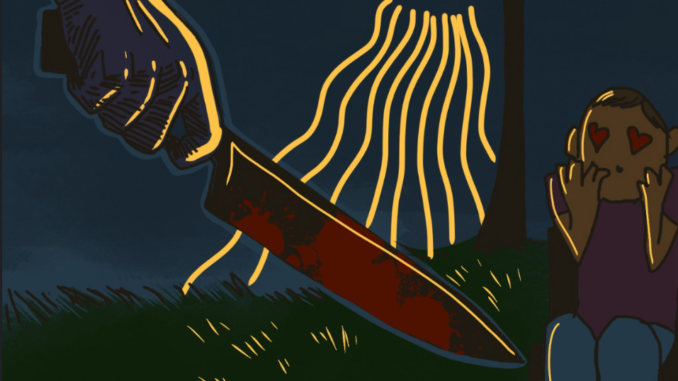
By Rami Mansi
With social media taking a recent interest in popularizing the taboo, glamorizing dangerous situations and people has become a trend that targets the sensitive and vulnerable masses through the media. The media dramatizing traumatic situations and twisting the truth to fit the plot line glamorizes dangerous real-life stories is just the start of another detrimental trend that impacts our futures more than our present.
A popular example could be seen through Netflix’s Dahmer, a show that was made to demonstrate the severity of the serial killer’s crimes yet in turn created unwarranted nor deserved sympathy for him. Through background and various plot points, the show dramatized the real events to the point of a distorted narrative, focusing on Dhamer and his actions rather than how his actions impacted the community and his victims.
Popular media has taken it upon themselves to create a narrative for various criminals in which they should be excused based on pure vanity, even though they committed atrocities against innocent people. Various TikTok edits glamorize these killers. Self-written books on platforms like AO3 and Wattpad foster chapter-long pieces that are purely raised off romanticizing these dangerous killers, dangerous situations, faux-mafia leaders, and more.
Referencing popular fanmade stories, to let the readers know what type of story it will be, they put a genre time the reader (genreXreader). With possible variations seen through Y/N, and multiple add-ins, among others. This concept has passed through the times of fanmade content ever since the day of the now archival Tumblr.
As social media users create these stories and posts accepting the media’s portrayals of the figures, higher industries take note that the public welcomes these topics and mainstream the stories of more transgressors.
Dramatizing the unfolded events, these shows remove vital atrocities to perpetuate the show’s faux-retellings. Keeping the public ignorant, and the acts unaccounted for, it is truly within the eyes of the beholder that transparency can be revealed.
Most beings have an innate response to understand their surroundings and explore new ideas and beings. Serial killers are no exception to the matter. What motive do they possess? Was this planned? What events and psychologies led them to this point in their lives?
However, the manslayers that are more commonly played on current-day cable are mostly psychopathic, have little-to-no motive, and often have undiagnosed mental illnesses. They are purposely portrayed as beings with little emotion who thrive off the kill (for the plot of the story of course). But these mindsets are far from the truth and as the media portrays them as such, viewers who are mindless to the misleading plot armor of their protagonists, view these people as the “Joker to their Harley Quinn”–their parasocial test subject to study.
However, it is not just murderers who are getting this romanticization but also dangerous scenarios regarding the mafia, which are more widely accepted by the public. Mostly promoted through the “big strong scary male mafia leader with the small meek submissive female love interest.” The mafia genre is widely regarded as home to cinematographiques’ best works. The mafia trope in books, especially on platforms like Wattpad and AO3, has deterred from its father genre of mafia culture and become something of a deterrent to the genre.
The objectification of criminals in mainstream television not only perpetuates misinformation but also lets those viewers live in their faulty delusions. The shows are deemed controversial for multiple reasons: desensitizing audiences to violence, allowing the romanticization of monsters both figurative and literal, and the glorification of real-life criminals and their actions.
Consumers must realize the power they have as the audience: the problem lies not only in the media we consume but how we, the audience, allow it to consume us.
If we let these shows dictate our social connections and understanding of danger, then we are simply pawns in our world. We must let the networks know that what they are portraying and how they manipulate the audience is not only morally and ethically questionable but also goes against everything they seem to prompt.
As we continue forward, let us all remind ourselves to watch these conversely-minded shows with the mindset of having our sense of individuality and empathy for both the victims represented within the media and for ourselves.
